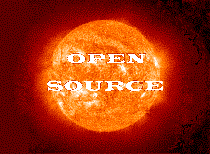PGTS Journal Edition 0003
June, 2002

Open Source Is Hot!
The Open Source Debate is starting to heat up. Is it more secure or less secure? The stakes are high when there is a world to win.
There have been some last minute additions to this edition of the PGTS Journal, this month. These came about as a result of three events. Two of them in my own microcosm, and the other one in the big wide web. The first event was an email. A friend of mine who lives over a thousand kilometers away in a NSW country town called Armidale, is grappling with the possibility of switching his computer system from Microsoft to Linux. He has had enough experience with computer systems to realise the dangers of changing anything. The thing that may have swayed him to change was an email sent by another friend of his who lives in Australia's Big Apple, Sydney. The email was initially titled Brian's Blurb, and it is published here as The End User's Perspective, more or less in its' original form.
The second event was a conversation with my wife. These often often occur at odd hours since she went back to work full-time night shifts. Now, I look after the kids during the day, while she sleeps. She opened the conversation by telling me about one of the surgeons at work who had bought a new laptop and he didn't have software like the other computers in the hospital, he had installed something called Linux, which had all this software that was free. He seemed to know a lot about computers, though possibly not as much as I did, since I had worked with them quite a long time hadn't I? And had I heard of this Linux? I agreed that I had been working with computers for some time, almost thirty years, though that didn't make me a world authority on the topic since there was lot to know about it, and yes, I had heard of Linux. So, she then asked me, how does anyone make money from it ... if it's free? There was a long pause. Did you hear me? she asked ... just checking to see if I was still receiving communication. I had not responded, while I thought about how to answer the question. I am still thinking about it as I write this. The famous "Cathedral and The Bazaar" by Eric S. Raymond, purports to answer the question. And it seems ok in theory. At the time, I explained to my wife that there things we do, such as volunteer work for the kindergarten, because we see a benefit for our children and the community. And that a similar type of volunteer work was occurring in the computing world. Also writing software was a creative venture. And creative people crave recognition, so much so, that they were willing to give away their creative efforts, if it would help achieve public recognition and fame. Of course in the previous (modern?) era the cost of distribution channels meant that giving away your creative effort to a mass market would have been prohibitively expensive. And apart from that a lot of the work people get paid for is actually services, rather than product, so it is possible to make money from working with Linux. Perhaps she should ask me about it in a year's time?
The third event has been the recent spate of stories regarding the poor security of Open Source Software. It came as no surprise to discover that the ultimate source of these stories was the Microsoft Corporation. Microsoft has always subscribed to the maxim: "attack is the best form of defence". Could this be the end of the phoney war and the start of the Second Clone War? If so it will be Microsoft that is under attack, and this time the clones will be software clones, not firmware clones as in the First Clone War. In previous conflicts such as the famous Battle for the Desktop Microsoft has chosen the battlefield and attacked from a position of strength. It is curious therefore, that with the DOJ bull-terrier still not completely giving up its' grip on Microsoft's nether regions, and powerful old foes like IBM lining up with new opponents like HP, Sun and Time Warner on the Open Source Side, that Microsoft should choose security as ithe theme of its' opening gambit. Lack of security is a major weakness in Microsoft software. Do they know something that the rest of the world doesn't? Do they have a secret weapon hidden in some Redmond Laboratory. A software "Death Star", that will be deployed in an overwhelming display of Imperial Force majeur, blasting to smitherens the Federation troops presently massing on Planet Open Source? Or has Microsoft finally lost the plot? Stay glued to your screens for the next enthralling installment, unravelling now on a Web near you!
Features
And on a less dramatic note, other features this month are as
follows:
Reading log files is perl's forte. In fact, parsing log files was one of the
principal uses that its' creator envisaged for this eclectic script engine.
An article on Parsing
Logfiles examines how to get some basic information out of Apache Log
Files. This article also contains some observations on robot
behaviour.
And yet another article on Search
Engines. Whenever this phrase comes up you can expect lots of opinion
and very little evidence. True to form, this article takes a rather
subjective look at this most popular of topics.
On the topic of Postgres there is an article on Creating links
in HTML with Postgres, which takes a look at dynamic HTML generated by
perl using PostgreSQL.

